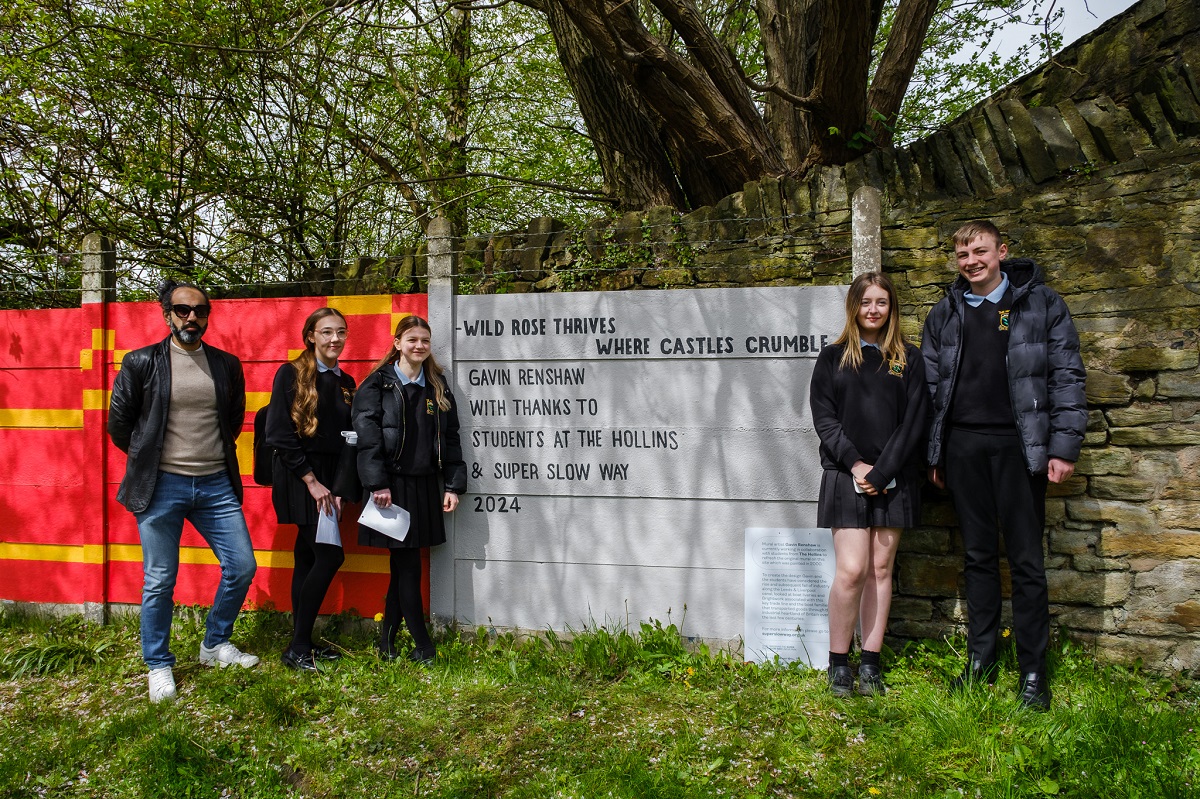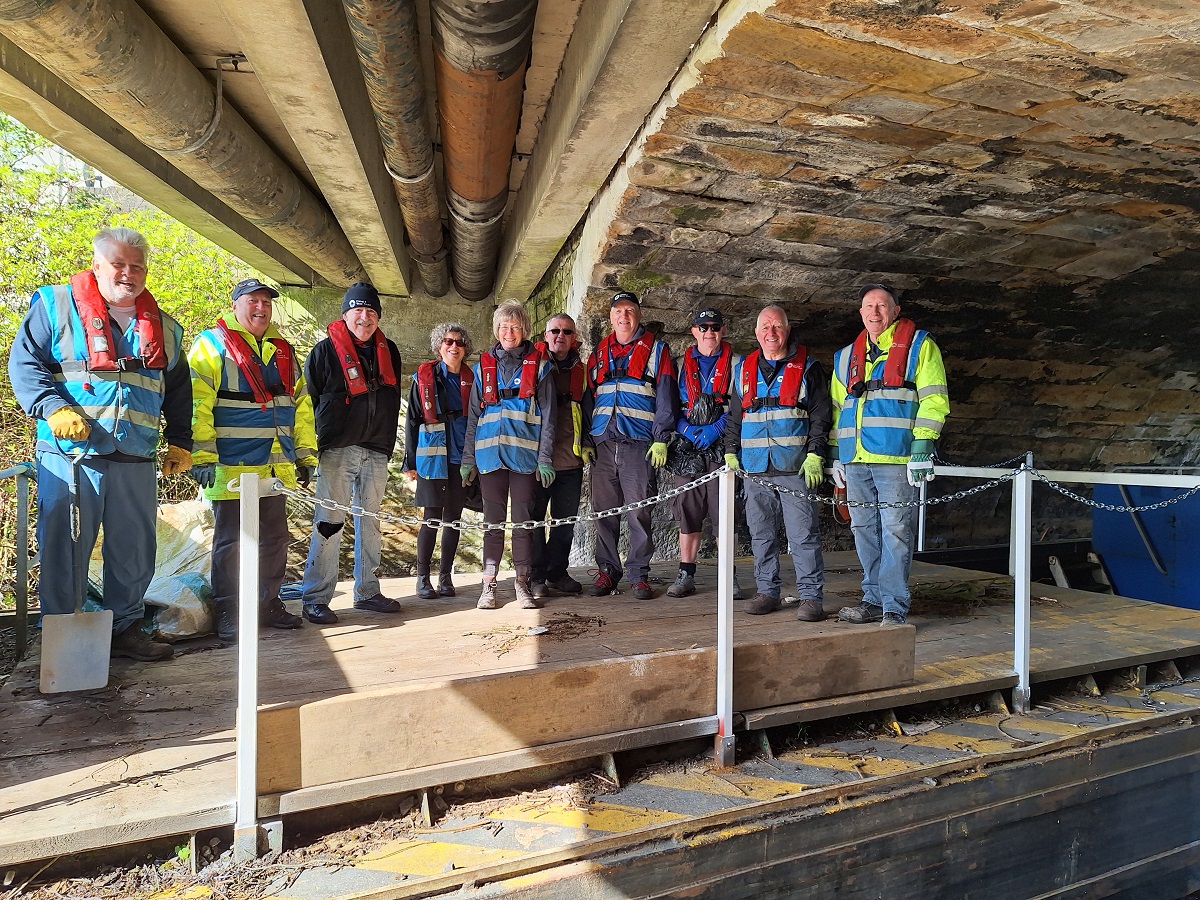Five years of canalside care from Hyndburn volunteers marked with new mural
Hyndburn Towpath Taskforce help keep the Leeds-Liverpool canal glowing - and May marks five years since they've been doing their work
The efforts of volunteers, artists and school children to improve the canal side for Hyndburn residents have come to fruition this month.
The beginning of May marked the fifth anniversary of the Hyndburn Towpath Taskforce, which carries out maintenance of the area, while a new mural brightening up a previously unloved stretch of canal was unveiled.
Lead volunteer for the taskforce Barbara Sharples said she is proud of the achievements of the small group, mainly made up of retirees, over the past five years and that the community is enjoying the Hyndburn stretch of the Leeds and Liverpool canal in growing numbers as a result.
“What we love is, when we’re working, people will come past and say we’re doing a great job,” she said.
“We just did some work at Pilkington bridge where there were some very large shrubs and it was very dark and uninviting. We cut the shrubs down to knee height which has let a lot of light in and we cleared all the mud and silt off the path.
“Now there’s a better surface for cyclists, prams and wheelchairs and it’s an attractive, welcoming space. A couple of ladies passed us and told us what a difference we had made.”
The taskforce, which meets every other Wednesday from 10am to 2pm, carries out vegetation maintenance, graffiti removal, litter picking, the painting of swing bridges, and path improvements.
“Access to nature is so important and it's about making the towpaths nicer so people can enjoy them,” said Sharples. “We’re all retired and we get a lot out of it too. It keeps us fit, we’re out in the fresh air. It’s good for our wellbeing and our physical health.”
The Super Slow Way is the cultural development programme that covers 20 miles of the Leeds and Liverpool Canal corridor stretching through East Lancashire, including Hyndburn. This month it unveiled a mural on the canal towpath in Church, Accrington. Artist Gavin Renshaw worked with students from The Hollins secondary school to create the work entitled ‘Wild rose thrives where the castles crumble’.
“Gavin did workshops with the young people and talked to them about the canal and what it means to them,” said Kate Kershaw, programme manager for the Super Slow Way.” The imagery is all about Brightwork – the paint used to decorate working boats on the Leeds and Liverpool Canal – but also canal scenes both historic and contemporary.”
The project came about, Kershaw said, after Sharples pointed out an existing mural, painted at the turn of the millennium, that had become worn away.
“The original mural was just in the middle section of a long concrete boundary wall and was a stylised map. Gavin has refreshed the original mural and extended it to cover the whole wall which is 120-metres long. We’re wondering if we should approach the Guinness Book of Records as we think it might be the longest mural on a canal.”

The Leeds-Liverpool canal. Credit: Jack Bolton
Hyndburn Towpath Taskforce volunteers on behalf of the Canal and Rivers Trust on the stretch of the 200-year-old canal’s towpaths between Whitebirk in the West and Hapton in the East. The trust is also the lead body that oversees work carried out by the Super Slow Way which covers 20 miles of the canal through East Lancashire. While the historic canals are still navigated by boats – with many mooring for short stays – their towpaths are increasingly popular spaces for walking, running, cycling, and angling as well as serving those accessing other on-water activities such as canoeing and paddle boarding.
According to the Canal and Rivers Trust, there were over 800-million visits to Britain’s canals last year, with people experiencing the daily mental and physical benefits of spending time in nature and by the water. Canals bring a £1.1 billion cost saving to the NHS each year due to people being active along its waterways and towpaths, it said.
In January the trust set out how these vital, historic and typically narrow routes can be sustainably used, managed and made more accessible in its Towpaths for Everyone policy. It outlines the value of investing in towpaths to partners such as local authorities as well as to wider society.
Canal and Rivers Trust director Heather Clarke said: “With towpaths more popular than at any time in history, we face challenges in balancing the needs of all the people who use them, while protecting their special waterway character, heritage and environment.
“As our ageing network faces increased pressures from government funding cuts and climate change-driven damage, it is more important than ever to secure investment from third parties to keep these much-loved spaces open and accessible.
“Our canal towpaths are perfectly placed to play a pivotal role in meeting the Government’s target to give everyone access to local quality blue and green space.”
The Church mural is accessed from Bridge Street where the Super Slow Way has also created a pocket park with artist Rebecca Chesney and members of the community. In preparation for the mural launch, Hyndburn Towpath Taskforce worked to improve the stretch of the canal towpath from the pocket park to the mural.
“We repaired all the potholes and did a lot of maintenance work,” said Sharples. “We spent half a dozen sessions repairing the towpath so it was better for mums with prams and people in wheelchairs who want to come and look at it. It was tough because the distance from our van to the furthest point of the mural was really far to go with wheelbarrows of materials. But it was worth it.”
Sharples said she would eventually love to see the entire stretch of canal towpaths through Hyndburn cleared and accessible to all.
“There are some parts that we can’t tackle as volunteers because it needs construction materials and in some cases they are quite remote between two access points. They are quite long stretches and it’s not physically possible for us to get close enough with all the tools and materials we need. We’re a small team and we can only do so much.”

Towpath Taskforce team photo taken at Rishton Bridge No 108A near the Canal View Cafe
The Canal and Rivers Trust hopes that in setting out its Towpaths for Everyone policy it can attract increased investment and strengthen partnerships to ensure this happens.
With the contributions of The Super Slow Way and the Towpath Taskforce, Hyndburn is a good example of where partnership working to improve canal sides is already happening, however. Kershaw shares Sharples’ ambition to see the entire stretch of canal through Hyndburn made accessible as part of the Super Slow Way’s wider vision to turn the entire 20-mile stretch of the Leeds and Liverpool canal in its remit into a Linear Park.
“The project is about community-led regeneration and some of those projects will be large infrastructure projects, but some of them will be small interventions that improve the environment for people, make it valuable and allow people to celebrate and value what is there,” said Kershaw. “It’s partly about social justice and everyone having a right to a nice environment.
But it will also bring economic development, jobs and money, which is fundamental to changing the fortunes of these areas that have been really neglected for decades.”
Artist commissions, such as the Church mural and pocket park, are one aspect of the project, while large architectural interventions will bring canal side structures into community use.
Funding for the project is a patchwork, Kershaw said, with small projects being funded through grants to The Super Slow Way and large projects being the responsibility of the individual councils to bid for.
In Blackburn the council has acquired Imperial Mill while, on the other side of the canal stretch, Nelson’s Brierfield Gas Tower is earmarked to become a community asset. In Hyndburn however, plans to regenerate Hargreaves Warehouse in Church have stalled following a fire at the site in 2022.
But Kershaw says while big projects are not as far along in Hyndburn the small interventions of the pocket park and mural as well as the improvements made by the Towpath Taskforce mean more has been done to improve the canal side for residents in the immediate term.
Realising this vision, she believes, is fundamental for Hyndburn communities.
“Psychologically it will allow people to value their space, highlight spaces that people already value, and bring people in from the outside to see them. It changes how people feel about their space so I think these small changes can be really transformative.”
The Lead is now on Substack.
Become a Member, and get our most groundbreaking content first. Become a Founder, and join the newsroom’s internal conversation - meet the writers, the editors and more.





